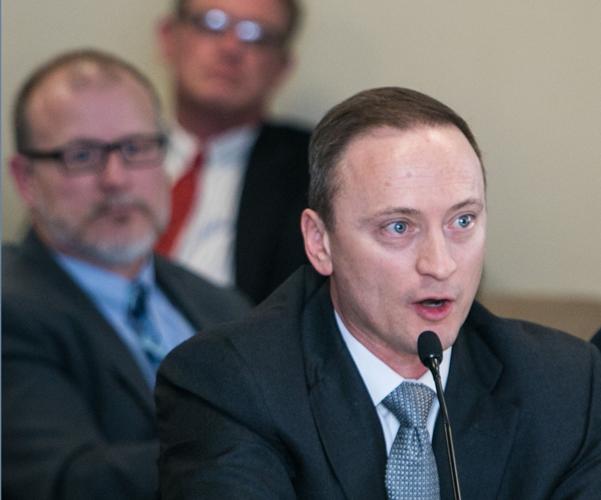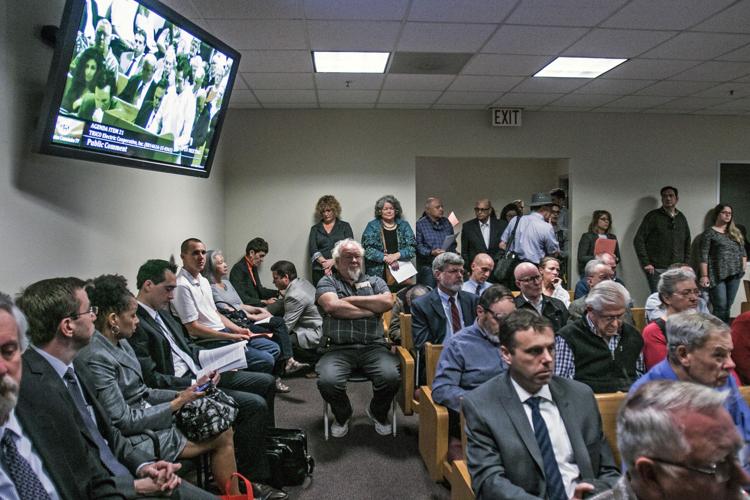State regulators approved rate increases Wednesday for both Tucson Electric Power Co. and Trico Electric Cooperative — and in a surprise move, voted to cut credits to Trico customers who install rooftop solar systems.
At an open meeting in Tucson lasting more than nine hours, the Arizona Corporation Commission unanimously granted TEP a rate increase that will add about $8.50 a month to the average residential customer’s bill.
Basic monthly charges for TEP home customers will increase to $13 from $10 for standard rates, and drop to $10 from $11.50 for residential time-of-use rates. The rates will go into effect as soon as TEP files its new rate tariffs, or no later than March 1.
The commission also approved a rate increase for Trico that will raise basic monthly charges by one-third, from $15 to $20, and add about $4 per month to the average Trico home customer’s bill.
In an unexpected move, the commission adopted a new solar export rate of 7.7 cents per kilowatt hour for Trico customers who file applications to install new rooftop solar installations after the commission’s rate order is filed in a few days.
In TEP’s case, the commission approved new time-of-use rates and adopted a plan to make such rates the default rate for new customers starting no later than January 2018, though customers can later opt onto the standard rate.
But the commission rejected TEP’s request to cut the three usage-charge tiers to two for standard rates, agreeing with a hearing judge who said keeping three rate tiers would help customers manage their bills as rates rise.
The new TEP rate plan also will move many business customers from a small general service rate class to a new medium general service rate class.
Additionally, the rate decision requires TEP to propose a new demand-reduction or load management program that would boost residential energy-storage for customers who generate their own power, with time-of-use rates to encourage peak-demand reductions.
The utility would have to come up with a plan in about four months and expect to spend about $1.4 million on such a program.
The commission passed on a proposal backed by some commissioners to allow large TEP customers such as copper mine Freeport to buy some power on the open wholesale market, citing uncertainty and potential cost shifts to other customers.
The commission also voted to cut discounts given to Pima County, Tucson and South Tucson by about 25 percent annually, or initially from 16 percent to 12.5 percent, until they are phased out.
CHANGES IN STORE
FOR TRICO CUSTOMERS
The utility panel voted to raise Trico’s fixed basic monthly charges to $20 from $15, despite opposition from some consumer groups and ratepayers who spoke Wednesday.
Trico had sought to boost its basic monthly charge to $24 for residential customers, arguing that it has been unable to recover fixed costs through volume-based energy charges. Trico officials said a higher fixed monthly charge would help the nonprofit cooperative recoup costs.
But Commissioner Andy Tobin successfully pushed an amendment to cut the requested monthly rate to $20, saying the 60 percent increase was “too much to swallow,” and several public commenters objected.
A representative of an energy-efficiency group and others said setting the basic monthly charges so high would disproportionately affect low-usage and low-income customers, who would be less able to manage their bills by curbing their power usage.
The lower basic monthly charge will be offset by higher usage charges, so Trico’s revenue increase will be about the same, Tobin noted.
Adoption of the new solar export rate came as a surprise, as the Corporation Commission had planned to set those rates in special proceedings of pending rate cases filed by TEP and other utilities.
The Corporation Commission voted in December to end net metering for new rooftop solar customers and replace it with a solar export rate based on comparable costs of energy from big, utility-scale solar farms or on extensive cost studies.
But the commission acknowledged that the electric co-ops are in different situations than investor-owned utilities like TEP, and gave the co-ops the option to use alternative methodologies to determine proper export rates.
Despite the objections of solar advocates, the commission set Trico’s new solar export rate at 7.7 cents per kilowatt hour, a little more than half of the current retail net metering rate of about 13 cents per kWh.





